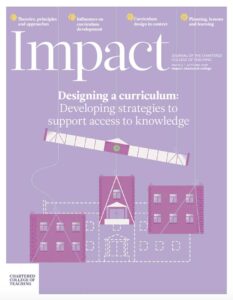Not all pupils arrive in the music classroom as novices, and some bring expert knowledge of a variety of musical traditions. This has important implications for debates around the place of knowledge and skills in the curriculum. Knowledge and skills are often proposed to exist as opposites, or one is considered to be more important than the other. Nick Gibb, speaking at the launch of the pamphlet ‘A Question of Knowledge’, said that ‘thanks to the work of Tim Oates and others, the new National Curriculum (Department for Education, 2014)put knowledge back at the centre of schooling’ (Gibb, 2017). This return to the predominance of knowledge as the key to educational success is partly a result of the work of cognitive science demonstrating that knowledge-based curricula create the best results for students (Parents and Teachers for Excellence , 2016). The nature of musical learning and musical knowing interfaces between
Join us or sign in now to view the rest of this page
You're viewing this site as a guest, which only allows you to view a limited amount of content.
To view this page and get access to all our resources, join the Chartered College of Teaching (it's free for trainee teachers and half price for ECTs) or log in if you're already a member.











